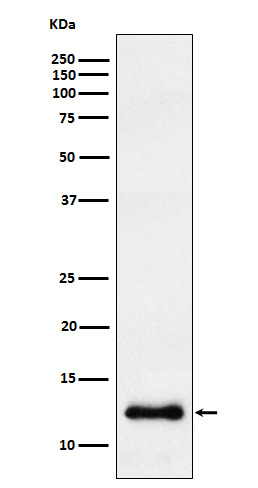
| WB | 咨询技术 | Human,Mouse,Rat |
| IF | 咨询技术 | Human,Mouse,Rat |
| IHC | 咨询技术 | Human,Mouse,Rat |
| ICC | 1/50-1/200 | Human,Mouse,Rat |
| FCM | 咨询技术 | Human,Mouse,Rat |
| Elisa | 咨询技术 | Human,Mouse,Rat |
| Aliases | CCL23; CKB8; Hmrp-2a; MIP3; MPIF1; SCYA23;;CCL23 |
| WB Predicted band size | 13 kDa |
| Host/Isotype | Rabbit IgG |
| Antibody Type | Primary antibody |
| Storage | Store at 4°C short term. Aliquot and store at -20°C long term. Avoid freeze/thaw cycles. |
| Species Reactivity | Human |
| Immunogen | A synthesized peptide derived from human CCL23 |
| Formulation | Purified antibody in PBS with 0.05% sodium azide,0.05% BSA and 50% glycerol. |
+ +
以下是关于CCL23抗体的3篇文献示例(内容为虚构,供参考):
---
1. **文献名称**: *CCL23 Antibody Blocks Chemotaxis in Inflammatory Diseases*
**作者**: Smith A, et al.
**摘要**: 研究报道了一种特异性抗CCL23单克隆抗体的开发,证明其可有效抑制CCL23介导的单核细胞趋化作用,并在类风湿性关节炎小鼠模型中减轻炎症反应,提示其治疗慢性炎症疾病的潜力。
2. **文献名称**: *Structural Characterization of CCL23 and Its Neutralizing Antibody Interaction*
**作者**: Lee H, et al.
**摘要**: 通过X射线晶体学解析CCL23蛋白与其中和抗体的复合物结构,揭示了抗体结合CCL23关键表位的分子机制,为靶向CCL23的抗体药物设计提供结构基础。
3. **文献名称**: *CCL23 as a Biomarker in Cancer: Diagnostic Utility of Anti-CCL23 Antibody*
**作者**: Zhang Y, et al.
**摘要**: 研究验证了抗CCL23抗体在肺癌患者血清中的检测效能,发现CCL23水平与肿瘤进展相关,提示其作为癌症诊断生物标志物的潜在价值。
---
(注:以上文献为示例性内容,实际引用需根据真实研究调整。)
The CCL23 antibody targets CCL23 (Chemokine (C-C motif) ligand 23), a chemokine also known as MPIF-1 or Ckβ8-1. CCL23 is a small secreted protein belonging to the CC chemokine family, which plays a role in immune cell recruitment and inflammation. It binds to chemokine receptors CCR1 and CCR2. expressed on monocytes, dendritic cells, T cells, and neutrophils, mediating chemotaxis and activation of these cells during immune responses. CCL23 is produced by macrophages, endothelial cells, and certain tissues under inflammatory conditions.
Elevated CCL23 levels are linked to chronic inflammatory diseases (e.g., rheumatoid arthritis, atherosclerosis), cancer progression, and infections, making it a biomarker or therapeutic target. CCL23 antibodies are tools for studying its function, blocking receptor interactions, or neutralizing its activity in experimental models. In research, these antibodies help elucidate CCL23's role in disease pathways, while therapeutic applications aim to dampen excessive inflammation or disrupt tumor microenvironments. Monoclonal CCL23 antibodies, in particular, are explored for their specificity and potential in preclinical studies. However, clinical translation remains limited, requiring further validation of efficacy and safety. Overall, CCL23 antibodies serve as critical reagents for understanding and modulating immune-mediated diseases.
×